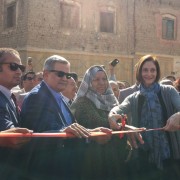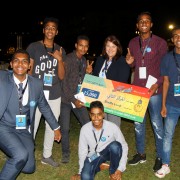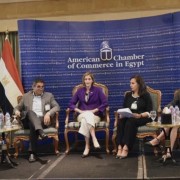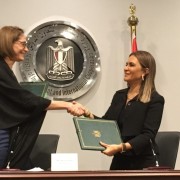Speeches Shim

In its ongoing effort to make a positive difference in the daily lives of Egyptians, the U.S. government has worked over the past forty years to support the Government of Egypt’s efforts to ensure that all Egyptians have access to clean water. On November 26, the U.S. Agency for International Development (USAID), in cooperation with the Assiut Potable Water and Sanitation Company and Egypt’s Holding Company for Water and Wastewater, inaugurated the Massara Water Treatment Plant and the Alexandria El Tahreer Wastewater Pump Station and Collection System in Assiut Governorate.

On October 16, nine technical school teams received awards for their innovative ideas in the Fanni Mobtaker Innovation Competition sponsored by the U.S. Agency for International Development (USAID), the Ministry of Education and Technical Education, and the Academy of Scientific Research and Technology. The top three prizes were awarded to Toqa Mahmoud Mohamed Mahmoud from Alexandria for her innovative food production technique; to Abdel Rahman Mohamed Abdel Salam and Omar Mahmoud Ramadan from Ismailia for their multi-purpose shipping container innovation; and to Emam Ali Emam Gomaa and Ahmed Hassan Abdel Moneim from Sharquia for their plastic and metal recycling machine. From over 2,000 applicants, 45 teams reached the final stage to present their plans and prototypes in sectors including logistics and renewable energy; industrial; and agriculture and tourism education.

Many of you know that USAID has a 40-year legacy of inspiring Egyptian success, but as the USAID Mission Director, it never fails to astonish me when I hear comments like, “I didn’t know USAID was still in Egypt.” And, truth be told, I hear comments like that even here, at AmCham events. So my goal is for you to leave here this morning with a better understanding of what we’re doing right now and what we have planned -- and to appreciate the impact we’re making, and the strength of USAID and Egypt’s strategic partnership.
You’ll hear me speak about COMMITMENT and CAPACITY. At USAID, world-wide, we’re looking to support a country’s journey to self-reliance by leveraging its policy-level COMMITMENT to effective, inclusive, and accountable solutions to educating their people, building a skilled and healthy workforce, ensuring economic stability, and other development challenges.
This multi-donor activity works to end violence against women and girls by combating sexual harassment, promoting legislative reforms, and improving support mechanisms for survivors of violence against women. The Safe Cities activity is strengthening the capacity of public institutions and community service organizations to provide victim services. These include shelters; first-contact service providers; and, community-based services for rehabilitation, health, and legal support for survivors and their families. In order to change perceptions, the activity supports advocacy efforts and uses innovative awareness-raising tools such as interactive community theater, storytelling, and art to promote a culture of zero-tolerance for violence against women, as well as a culture of responsibility towards the survivors of this abuse. Safe Cities is also promoting the safety of women and girls in public spaces, such as the development of community-managed ‘women-friendly spaces,’ street lightning, safe markets, and safe transportation.

The United States today committed an additional $16.5 million to support joint U.S.-Egypt priorities in basic education and agribusiness. We undertook this commitment in two amended bilateral assistance agreements, signed by Egypt and the United States, through the U.S. Agency for International Development (USAID), demonstrate the continued support of the American people to development in Egypt. The agreements will provide Egyptian youth with access to quality education and help Egyptian farmers access global markets.


Comment
Make a general inquiry or suggest an improvement.